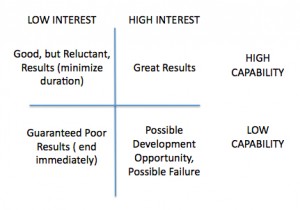Growth can wreak havoc on employees and company performance. As companies grow, employees are stretched, morphed, overwhelmed, and trapped. Meanwhile, fundamental company needs are often ignored. But it doesn’t have to be this way.
Growing into Unhappiness
Growing into unhappiness is totally common. What happens is a long-term, trusted employee grows up with the company, takes on new responsibilities as needed, and does reasonably well in many different roles. Unfortunately, after several iterations, the assigned responsibilities are often far removed from the passion and interests of the individual. This long-term employee could be a founder, who winds up as CEO, but would really prefer to be immersed in the technology and innovation that made the company succeed in the first place. Or it could be a salesman who now finds himself behind a desk, managing others when he would rather be out talking to customers. There are countless scenarios that can end in unhappiness regardless of individual characteristics.
Growing into Failure
Not only might these employees grow into positions that make them miserable, they may also find themselves failing. The most important differences among jobs have nothing to do with the things that capture attention: title, salary, status, and office location. The most important differences involve how you spend your time all day every day, the types of decisions you have to make, and your relationships with customers, suppliers and other employees. That CEO who would rather be immersed in technology may not only dread talking to the media and making huge decisions, he may be really bad at it. The salesman turned manager may be far too assertive and impatient to coach others effectively.
Whether disinterested or ill equipped, both find their personal priorities colliding with company priorities. The unhappy and/or uncomfortable CEO may consciously or unconsciously avoid critical activities. While old friendships and management-by-walking-around make good excuses for mingling with the engineers, that’s not the real motivation. And that amazing, automated tracking spreadsheet didn’t just appear. The CEO spent four hours creating it; four hours that would have been better spent talking to critical customers. The new sales manager is also driven toward the wrong priorities: contacting customers instead of supporting salesman, and learning about new products instead of learning about direct reports.
Fit is incredibly important. Employees in positions compatible with their interests, natural inclinations, and capabilities are far happier, more productive, and more successful than others.
The most common scenarios that lead to these growing pains all have one thing in common – too little attention to, and understanding of, personal inclinations, motivation, and productivity:
- Company growth – “Someone’s got to do it” coupled with “We can’t afford to hire someone new right now.”
- Ego, greed, and other personal confusion – “Wow! That’s an offer I can’t resist!”
- Career climbing drive – “I’m a failure unless I become a CEO!”
- Misguided rewards – “She is fabulous! Let’s promote her!”
It is so much easier and seemingly safer to juggle existing employees than to figure out what you really need, determine the strengths of existing employees, and find the right people to fill the gaps. Nonetheless, that’s what my most successful clients do.
“Growing Into” is Only Part of the Problem
As employees move into new roles, they aren’t the only ones who can be negatively affected. If you are leaving behind responsibilities you love, it can be hard to let go. But you must. Micromanagement and constant intervention undermine the growth of those taking on your old responsibilities. They need you to get out of their way.
They also need support. Small companies, in particular, are notorious for promoting people into more powerful positions without teaching them how to manage others. You’d be amazed at how often my clients list their main responsibilities and “forget” to put management on the list. If you have direct reports, management better be on your list!
What Should I Be Doing?
As companies grow and individual roles morph to fulfill immediate needs, things can get pretty crazy. Not only do individuals end up in the wrong places, fundamental responsibilities necessary to any organization may be completely neglected.
| Level | Fundamental Responsibilities |
| Executives | Create the future Coach the managers |
| Managers | Ensure all groups, products, and processes are productive, profitable, and working effectively together Coach the supervisors |
| Supervisors | Run the day-to-day business Coach the workers |
| Workers | Deliver as promised |
This stratification isn’t rigid. It does not mean supervisors aren’t helping to streamline processes or workers can’t help identify product opportunities. It also doesn’t mean that there won’t be some overlap between levels, especially in smaller companies.
But it does mean that someone needs to be looking out for the future, someone needs to ensure profitable execution, and someone also needs to meet existing customer expectations.
Furthermore, everyone with management responsibility must manage; “Boss” is not just a title.
Which of these fundamental responsibilities is most neglected in your company? Are the executives caught up in daily affairs? If so, who is ensuring a strong future? Have you migrated into a position that drains or strains your effectiveness? Who would secretly love to return to former responsibilities?
To avoid the hazards of growth, ensure enthusiastic, capable, and realistic ownership of the four fundamental responsibilities. And to minimize mismatches between people and positions, stress fit, effectiveness, and happiness over titles, promotions, and other career climbing incentives.



Comments are closed.